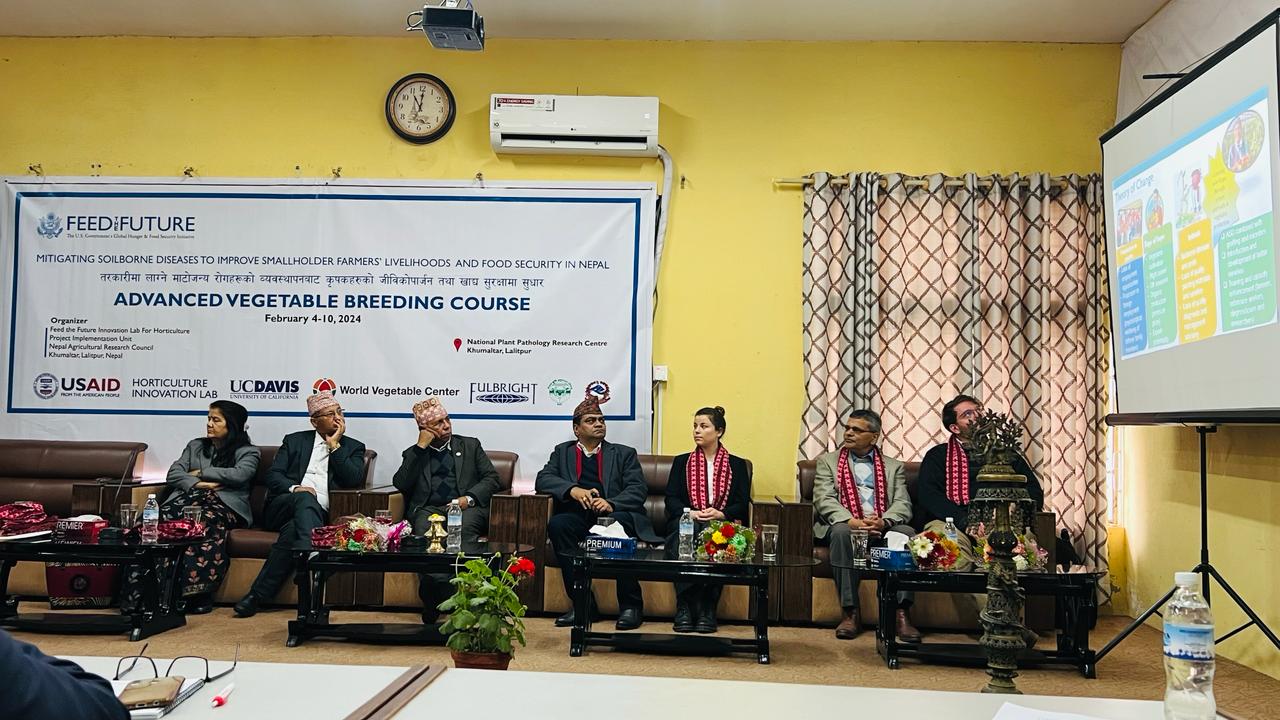
Accelerating fruit and vegetable breeding in Nepal
In Nepal, like in many countries, limited investment in research and development (R&D) for fruit and vegetable breeding has hindered the capacity of large scale breeding developments, resulting in high dependence on other countries for sufficient supply of fruits and vegetables, as well as seed. Farmers have faced unstable seed supply, inconsistent quality, and poorly adapted varieties, leading to crop failure and threatening food insecurity – which drives further reliance on imports of fruits and vegetables.
To increase the capacity for breeding development that aims to enhance the income and livelihoods of farmers, while increasing food security in Nepal, Principal Investigators at the Nepal Agricultural Research Council (NARC), Dr. Ram Khadka and Dr. Ranjana Rawal, are leading efforts to develop the practical skills and knowledge of young plant breeders as an initiative under their project, “Mitigating soilborne diseases to improve smallholder farmer livelihoods and food security."

Nepal boasts a wide range of agro-climatic zones suitable for a high diversity of fruit and vegetable production and a diverse range of climate resistant, nutrient dense, and tasty landraces – including 435 species of vegetables in 15 different agroecosystems! The land’s valuable resources and breeding potential was highlighted throughout a 7-day Advanced Vegetable Breeding Course at the National Plant Pathology Center, which brought together 31 participants comprising of NARC researchers, university faculty, government representatives, and private sector actors.
The optimism from the engaged participants throughout the week was palpable. One participant, Biju Adhikari, an intern at NARC, beautifully summarized her experience and conclusions:
“As a graduate intern, the week-long advanced vegetable breeding course was undoubtedly a fascinating and enlightening experience for me to learn about the state of vegetable breeding, its prospects, and its challenges from both national and international experts. Despite knowing that Nepal is rich in locally adapted landraces that are not optimally utilized, it saddens us to know that there are only few works done related to breeding of vegetables. Thus, the majority of current research efforts should focus on developing durable, productive, and resistant vegetable breeds including scientists, research institutes, commercial seed businesses, and intern students.”

Participants were immersed in lessons in advanced breeding techniques like marker-assisted selection and Qualitative Trait Loci (QTL) analysis, as well as knowledge crucial for developing fruitful breeding programs, including varietal maintenance, seed production, participatory varietal selection, commercialization, and marketing. Hands-on guidance in the greenhouse and laboratory provided participants the opportunity to learn and practice critical lab skills in DNA extractions, Polymerase Chain Reaction (PCR), and gel electrophoresis – a first for many young scientists in attendance who do not have access to advanced laboratory experiences during their early studies.
A panel discussion on the closing day of the course gathered experts from across sectors, stimulating discussions beyond vegetable breeding, into the need for cross-sectoral collaboration and using research to advocate for beneficial national policy changes. Local and global panelists underlined the importance of regular exchange of knowledge and genetic resources to advance breeding in Nepal.

